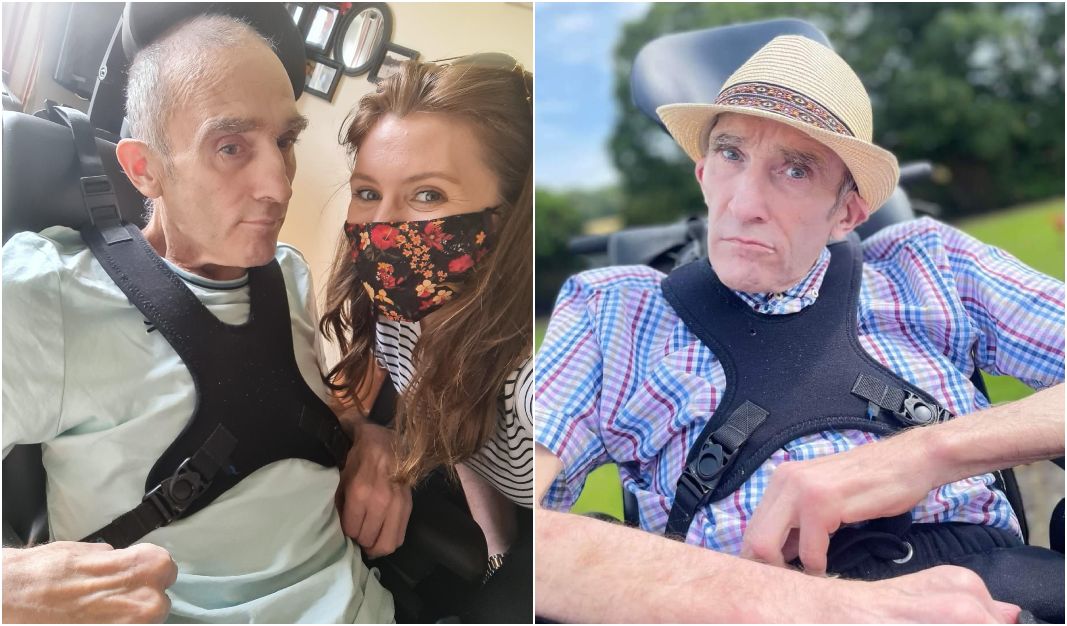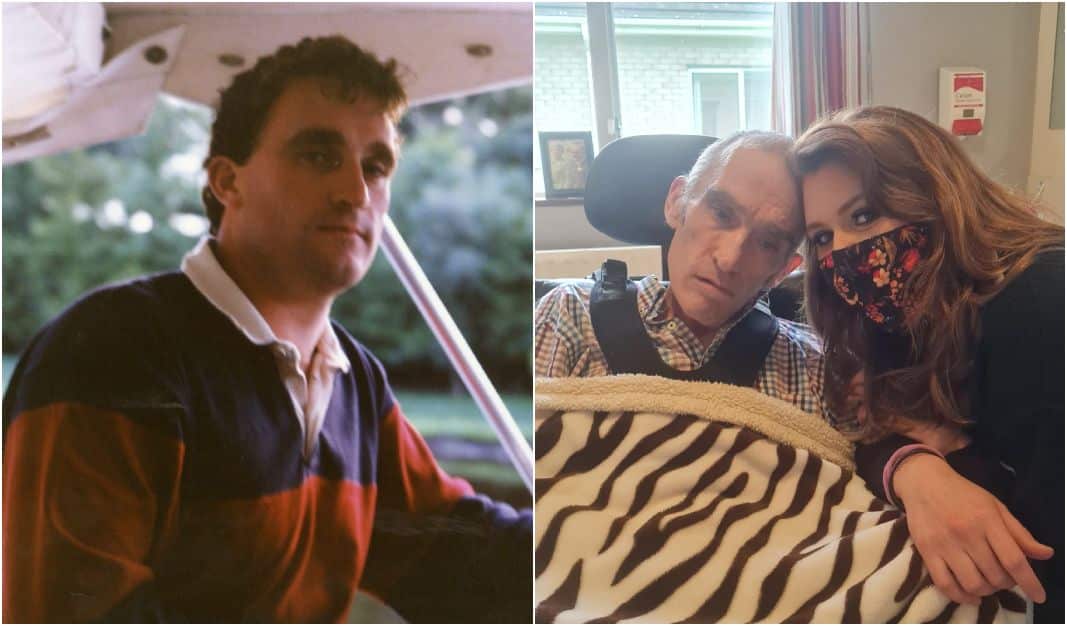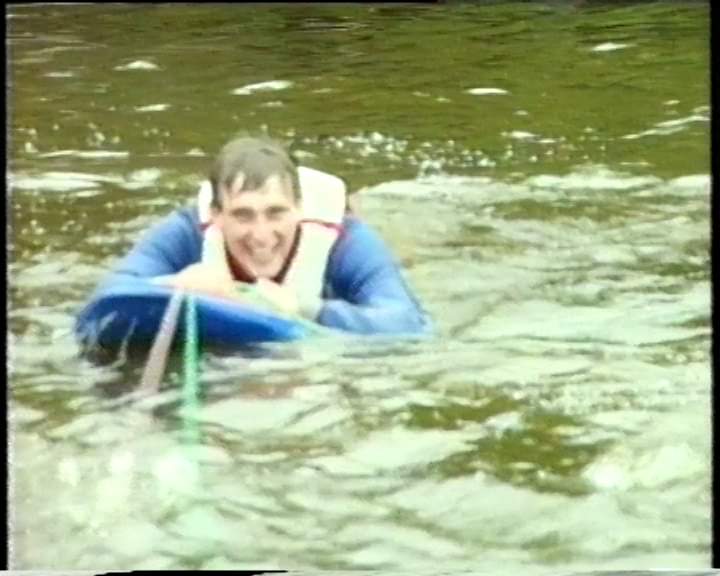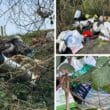
A County Armagh woman who watched her dad with a brain disease slowly die in his final days says it scared her senseless as “I felt like I was watching my own future”.
Ashley Clarke, from Killylea, lost her dad Desmond on August 31, last year, after 14 years of deterioration following his Huntingtons Disease diagnosis in 2008. He was just 56.
Ashley, who turns 30 next week, says the disease is genetic and the only way she’ll know if she’ll suffer the same fate is to get tested – something, she admits, fills her with dread.
“When dad died, I think because of what I witnessed, I think it scared the life out of me because I felt like I was watching my own future and what might actually happen to me,” she said.
“I can’t speak for my brother, maybe he was thinking the same but it just all came flooding back, those 14 years and what we’ve gone through as a family.
“My dad, my brother and I were on this journey and that was the end of it; it just felt like I was watching the future and I was sitting going, that could be me in that bed, and it could be my mummy and my brother and they could be sitting looking at me questioning whether or not to feed me – that’s a feeling that nobody should ever have to experience it. That’s a really weird feeling and it’s very overwhelming.”
When Desmond was diagnosed in 2008, Ashley and her brother, Ryan, took on the carers’ role – Ashley was just 14 at the time. She Googled what it all meant and inevitably was faced with internet horror stories.
“It was so scary,” she admitted. “I was seeing things like people hiding Huntingtons patients because they were ashamed, that people were thinking there’s something wrong with that family; that family’s got a defective gene, etc. I thought, it’s time to make a change, I’m going to help other people and not have it that 14-15 year-old kids are reading these scary stories.
“Thankfully we’ve come a long way since and awareness is getting better.”
Ashley recalls her dad being accused of being drunk in public which prompted her into creating her #imnotdrunk blog.
She was a firm protector of her dad, just like her dad was of her, which is why his downward spiral into ill-health over the years became harder and harder for Ashley and the family.
Ashley was – and remains – so proud of her dad. And one of the proudest moments in her life was when she graduated from university. Unfortunately she wasn’t able to have her dad there “which was quite upsetting because that was a big thing in my life, going to university”.

“Dad always pushed us to go to university,” she said. “But we made the best out of the situation on graduation day. As soon as I walked across that stage, and I got my wee bit of paper, then we ran to the car, we raced down the road from Coleraine to Armagh, into the nursing home where they had daddy sitting in his wee seat with a balloon tied to his wheelchair. They had cleared out a room for me, and my family and mum had left a cake and gifts in the day before. We had our own little graduation party, just us as a family, with dad, so we still got to include him.”
Ashley and Ryan looked after their dad at home for eight years before he was eventually taken into Greenpark Nursing Home in Armagh on a permanent basis where he received excellent care – it became like an extended family.
Said Ashley: “Ryan and I did our best. We did our utmost best to keep him at home as long as we could but with the progression of the disease, safety started to be a question. That was where we always said we would draw the line, when he was no longer safe at home.”
Ashley recalls how they had their dad in several different care homes for respite before his permanent move, something they always found difficult doing, even at the best of times.
On one occasion he went in to one particular home for a week; Ashley was nervous about how receptive he would be to the idea.
“After he came home and I asked daddy what he thought, ‘did you like it in there? Were the staff friendly? Did you make any friends?’ His response: ‘I don’t want to go back’. And I was like, ‘Oh, God. No, daddy, that’s okay. I was like, why do you not want to go back?’….’I didn’t get enough spuds’, he told me.
“To completely rip this nursing home because they wouldn’t give him enough spuds – when I know they were giving him plenty – was unbelievable.” Ashley laughed.
In the end, it was in Greenpark that Desmond would spend his final years.
“I knew the cook really, really well, so of course, I went straight in, I was like, ‘load his plate up and when you think you’ve given him enough, give him a little bit more’. But he loved it in there.”
She added: “He was so young for a nursing home; at the start he could speak well enough and move about. He was a real character in there. I think the care assistants just got a real giggle out of daddy and he had them all wrapped around his little finger.”
That was in 2018. Two years later saw the onset of the Covid-19 pandemic and that had an impact on everybody, in particular Desmond. Ashley and the family went 14 months without any physical contact which was heartbreaking for all involved.
“Because I didn’t see him properly for so long, after the pandemic I saw such a difference, it was such a big shock,” she recalled.
Desmond was in and out of hospital during his time. Ashley always hated those calls. To her “those calls are the scariest phone calls you will ever get”.
In the end Desmond was taken home from hospital after suffering from suspected aspiration, ingesting food into the airways – a common cause of death for Huntingtons patients. Back at his home in Greenpark Desmond would eventually pass away. The week leading up to the end was the toughest of Ashley’s life.
“I didn’t leave his side from the Sunday until the early hours of Wednesday morning, when he died. I slept on the floor in his bedroom because he had full blown aspirated. It was the worst thing I’ve ever, ever had to watch. I would not wish that on my worst enemy. It was the hardest four days of my life, I sat by his side, the entire time.
“I always knew it was coming. I always knew something would cause him to die. He was never going to last forever, but I don’t think I was prepared for that.
“Afterwards someone told me that my dad’s not gone, that he’s left a legacy behind and that they knew I would keep that going. And that’s exactly what I want to do now.
“Dad had a beautiful journey from surviving a plane crash to being one of the most amazing water skiers I’ve ever seen, to just absolutely loving life. He kept fighting to the bitter end; even that week and a half that we were sitting with him, he never gave up, he fought, his heart was strong, he wanted to fight.

“You will never know how hard it is to sit beside your daddy and just sit there and say, ‘Daddy, it’s okay. Daddy, you can go. Uncle Alistair and Uncle Raymond are up there waiting on you, you can go be with them. It’s okay, me and Ryan, we’ll be fine’. To sit and say that to your daddy but he was fighting so hard to stay. His wee body just wasn’t fit anymore. His wee body just couldn’t fight anymore. That’s what drives me – his fight.”
Ashley went on to work for the NI Huntingtons charity six months after graduating as a youth events and fundraising officer – “the most amazing job I’ve ever had, I loved every minute of it”.
She’s now involved with the Huntingtons Disease Youth Organisation where she started the ambassador programme with ambassadors from around the world.
She has told her story at some of the world’s most influential pharmaceutical companies and arenas and she will continue to do so.
“If I can help just one person, not be afraid and if I can make one person, feel not alone, and help them to see all the amazing people out there to help and support them, then I’ve done my job.”
Ashley doesn’t dismiss the fear as “it scares me every day”.
“It scares me that I will someday possibly lose my voice and I will lose the ability to fight but I really, really hope that I have done enough, working with the community, working with different organisations, working with pharmaceutical companies, I really hope that I will have done enough to help somebody, help some people and maybe somebody else will be able to keep going in my place, if I’m not able to do that.
“If I am so incredibly blessed to test negative for this disease, I will never stop fighting for the people who do lose their ability to fight and their ability to use their voice because I know what it’s like.”
To find out more about Huntingtons Disease Association NI, click here. To find out more about the Huntingtons Disease Youth Organisation, click here.




